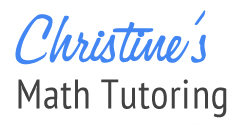Frequently Asked Questions
How often do you need to see my child for math tutoring?
- I see most of my students once a week for a 45-minute or a 60-minute session. An hour a week helps most students who meet or are close to meeting grade level math requirements to improve skills, understanding, grades, and confidence.
- Students who don’t meet grade level expectations, or struggle with homework, benefit most if I see them twice a week initially. Once they’re close to meeting school requirements and have developed more effective study skills, we can go to once a week and monitor how your child is keeping up.
- Since we will be in ongoing communication about your student’s progress, we can tailor the frequency of the lessons, like everything else, to your child’s needs.
Don’t you think one hour lessons are too long for a child with concentration problems?
- This is a very frequently asked question. Amazingly, most children, even those diagnosed with ADD or ADHD, thrive on one hour sessions — when the lesson is arranged to actively engage them in the learning process.
- Students with concentration problems respond well to alternating approaches. Using a variety of math activities (using models, making drawings, applying fractions to word problems,etc.) often leads to greater focus and increased learning and retention. Proper pacing and adjusting the difficulty level to create just the right amount of challenge are also essential.
- A one hour, one-on-one session allows students to enter math on a deeper level. We can cover a range of activities that may include skills practice, problem solving, conceptual understanding, and student-generated questions — all necessary elements of growth in learning, competence, and confidence.
- For more ideas, your may wish to read the article “Helping you Child to Focus on Math“.
What curriculum do you use?
- For students meeting or close to meeting grade level requirements, I support the student’s school curriculum. This often involves adding activities that complement the curriculum. If, for example, the curriculum is mostly skills based, I may add activities involving problem solving, models, and drawings. If the school is using a mostly exploratory curriculum, I may add direct teaching of specific concepts and skills.
- My approach depends on your student: how does she or he learn best?
How do you address confidence issues with students who lacks it?
- Students who lack confidence in math either lack skills their school expects them to have, or feel (justifiably or not) that they are unable to make progress in learning.
- Too often, school curriculum moves on to the next topic before the previous one has a chance to be absorbed. The student may be left feeling lost and disheartened. One-on-one tutoring, sensitive to the students needs and strengths, can help the student discover him or herself as a math learner. The element of self-discovery is important.
- To gain confidence, a student must not only be a successful learner, but must also see and appreciate him or herself as one. The student needs to see that he or she can do the math problems and that they make sense.
- I help students clarify their knowledge by teaching skills, methods, concepts, and problem solving strategies with a variety of approaches adjusted to address the individual student’s needs, strengths, and interests. We persist, varying the approach to sustain interest, until the student owns the skills and concepts.
- At this point, when math makes sense and a certain fluidity of math skills is achieved, the student will be confident. This is when students who have long insisted that they hate math, suddenly declare it their favorite class.
- For more ideas, you may wish to read the article “How Can You Help Your Child Learn Math?“
Can I stay with my child or do you want me to leave?
- You can always stay while I’m working with your child. You can leave when your child feels comfortable being left.
Do you have contracts?
- No. All you have is a month-to-month commitment. On the last session of the month you pay for the following month’s lessons.
- Regularity is necessary for genuine growth and confidence in learning. For the occasional times your child can’t come at the scheduled time, please give me a 24 hour notice and I’ll try to find an alternative time for a make-up lesson.

